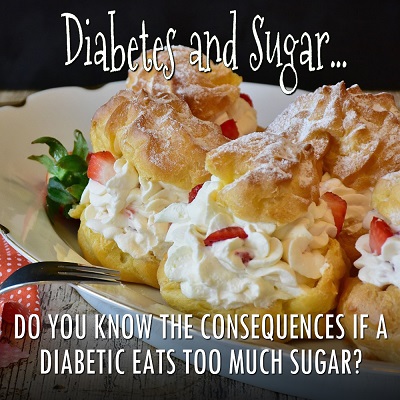 Everyone experiences food cravings from time to time and quite often the targets are foods laden with sugar. These sugar binges affect almost everyone. If they are only a rare occurrence, the effects may not be noticeable. However, what really happens when a diabetic binges on sugar-laden foods?
Everyone experiences food cravings from time to time and quite often the targets are foods laden with sugar. These sugar binges affect almost everyone. If they are only a rare occurrence, the effects may not be noticeable. However, what really happens when a diabetic binges on sugar-laden foods?
The severity of damage that may result from a sugar binge episode depends largely on the quantity of sugar ingested, and the regularity. If your sugar bingeing happens on a regular basis, it is not at all healthy! It may cost you your health and eventually your life.
Diabetic vs. Non-Diabetic Response
After a sugar binge episode, you are very likely to suffer from immediate consequences, due to the ‘sugar spike’. Symptoms occur soon after, as your body is letting you know that you have too much glucose in your bloodstream.
In this circumstance, a person with a healthy insulin response (a non-diabetic) will very quickly release insulin to deal with the excess glucose.
However, a diabetic’s response will not be the same. A type 1 diabetic’s response will mostly depend on their self-administration of insulin.
A type 2 diabetic, who is not likely not taking insulin, will experience prolonged, elevated blood glucose levels, with all the problems and dangers that incurs.
That is because even though insulin is released in response to the sugar load, the insulin-resistant cells simply fail to respond effectively, leaving the blood awash with glucose.
Immediate & Short-term Effects of Eating Too Much Sugar
Excessive Urination
Frequent or excessive urination is medically referred to as polyuria. Polyuria occurs as a result of having too much glucose in the blood. Polyuria is the body’s desperate way of removing glucose from the blood.
Kidneys are designed to absorb some glucose to be rechanneled back to the bloodstream. However, for diabetics, each time their kidneys create urine, excess glucose is added to the urine, instead of directing it back to the bloodstream. The kidneys draw additional water from the body to create the urine needed to expel the excess sugar.
Excessive Thirst
Excessive thirst is medically referred to as polydipsia. This occurs as a result of polyuria, as the body exerts efforts to rehydrate itself. Because the body is directing available fluids to the kidneys, the cells send dehydrated signals to the brain.
Once your brain senses the occurrence of dehydration in the blood, it will immediately create the urge to drink more fluids. The mistake people can make here is that because they’ve been urinating excessively, they believe they’ve been drinking too much.
What they may not realize is that their excessive thirst and urination are all caused by too much sugar. In some other cases, people tend to quench their thirst by drinking more fluids containing sugar, such as sodas and other sweetened beverages. As a consequence, the complications become even worse.
Excessive Hunger
Because the muscle cells of a type 2 diabetic are less responsive to insulin than they should be, glucose stays in the blood, instead of being accepted into the cells to be used for their energy needs.
When the cells can’t gain access to glucose, they will automatically send out signals that they require sustenance. The brain interprets this as a starvation response and sends out signals through its signaling hormones such as ghrelin, leptin and orexin. These hormones signal the hypothalamus part of the brain to trigger feelings of hunger.
This is because the brain doesn’t have any idea that the cells have been starving in the midst of abundant blood glucose. Due to deficiency, and/or inefficiency of insulin, this glucose in the blood remains inaccessible to cells.
This is not an exhaustive list of acute complications for diabetes. Other complications that may be experienced after having a sugar binge can be headaches, fatigue, confusion, difficulty concentrating and a dry mouth.
Longer-Term Effects
Excessive consumption of sugar can have toxic effects on the body’s organs. If left untreated, the high levels of sugar can result in cellular dysfunction which sets the stage for insulin resistance, and can worsen other symptoms of diabetes.
If eating too many sugary foods becomes a common habit, the risk of stroke and heart attack is multiplied. Many sugar-laden foods are also full of ‘unhealthy’ fats. That doesn’t mean all fats are unhealthy, however, there are some that are. Foods high in both sugar and fat, contribute to the possibility of inflamed and clogged blood vessels.
Think twice before indulging in too many sugary foods. They won’t help your health, regardless of whether you are a diabetic or not.






